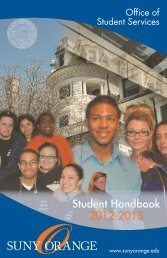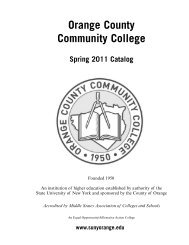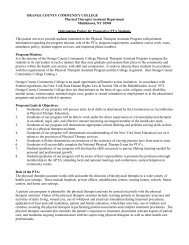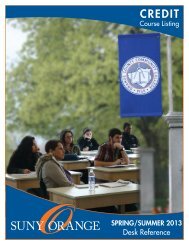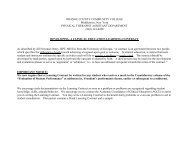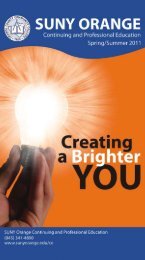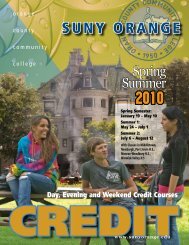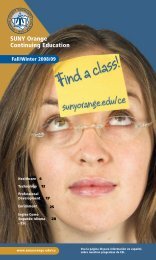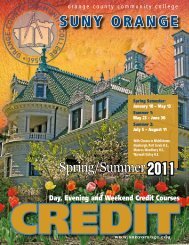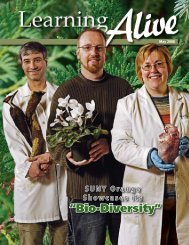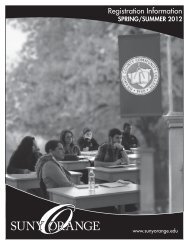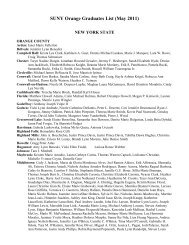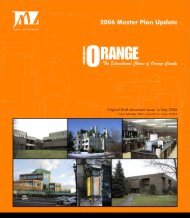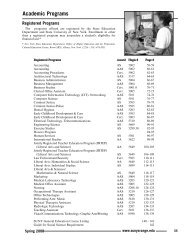Create successful ePaper yourself
Turn your PDF publications into a flip-book with our unique Google optimized e-Paper software.
Economics - Education<br />
Economics<br />
(Global Studies Department)<br />
ECO 201—Macro-Economics<br />
3 cr. (Fall/Spring)<br />
Topics include the central problems of every<br />
economic system, individual and family income,<br />
business organization and income, fiscal and<br />
monetary policy, the national income measurement,<br />
the banking system, the business cycle, international<br />
economics, and the economic role of government.<br />
Fulfills category A. (GE 3)<br />
ECO 201DL—Macro-Economics<br />
3 cr. (Fall/Spring)<br />
Distance learning course. Topics include the central<br />
problems of every economic system, individual and<br />
family income, business organization and income,<br />
fiscal and monetary policy, the national income<br />
measurement, the banking system, the business cycle,<br />
international economics, and the economic role of<br />
government. Access to course materials, assignments,<br />
and other resources are available through the Internet<br />
using "Blackboard." Students communicate with the<br />
instructor and other classmates via email, and<br />
participate in class discussions using "Discussion<br />
Board." Testing and group projects are done online.<br />
Fulfills category A. (GE 3)<br />
ECO 202—Micro-Economics<br />
3 cr. (Fall/Spring)<br />
Topics include alternative economic systems, wages,<br />
interest rent and profits in our society, economic<br />
theory of business costs and revenues, determination<br />
of price by the forces of supply and demand, the<br />
psychological factors in economic behavior, ethics as<br />
related to our economic system and the nature of<br />
competition in contemporary American business.<br />
Fulfills category A. (GE 3)<br />
ECO 203—Economic Development<br />
3 cr. (Fall/Spring)<br />
Economic development is concerned with the<br />
efficient allocation of science resources in relationship<br />
to sustained economic growth over time with<br />
emphasis on such underdeveloped regions of the<br />
world as Africa, Asia, and Latin America. The<br />
economic, political, historical, cultural and<br />
geographical factors which have contributed to<br />
economic underdevelopment will be analyzed, and<br />
these mechanisms, necessary to bring about<br />
improvements for the impoverished populations of<br />
these regions will be stressed. Fulfills category A.<br />
Prerequisite: ECO 202 or ECO 201<br />
Education<br />
(Education Department)<br />
NOTE: Students must comply with all policies,<br />
procedures, and regulations of the internship/field work<br />
site. Failure to do so will result in immediate removal from<br />
the internship site and automatic failure of the course.<br />
Evidence of fingerprinting through NYS Department of<br />
Education is mandatory for students in the Jointly<br />
Registered Teacher Education Program or those in other<br />
programs who are registering for EDU 103 and EDU 207.<br />
Please see your advisor or visit our <strong>SUNY</strong> <strong>Orange</strong><br />
Education Department website for more details.<br />
Child Developmental Associate credential candidates<br />
(CDA) are eligible to take: EDU 101, EDU 102, EDU<br />
111, EDU 201, EDU 202 and EDU 206 without certain<br />
prerequisites. See Early Childhood Coordinator. A<br />
grade of C (2.00) or better is required in all EDU<br />
courses for progression in the program and graduation<br />
with an A.A.S. or Certificate in Early Childhood.<br />
EDU 101—Child Development 1<br />
3 cr. (Fall)<br />
This course provides study of human development<br />
and behavior from conception to age two. Topics<br />
include: heredity, physical growth, sensory and<br />
perceptual development, early brain development and<br />
research, adult-child interactions, relevant development<br />
and learning theories. Up to four (4) hours of directed<br />
observation beyond classroom hours are required. A<br />
grade of C or better is required to continue and<br />
graduate in the A.A.S./Certificate program.<br />
EDU 102—Child Development 2<br />
3 cr. (Spring)<br />
This course continues Child Development 1 to age 8<br />
years. Additional emphases of study include language,<br />
emotional, social, and moral development, typical and<br />
exceptional cognitive development, measurement and<br />
assessment, self-concept, cultural, family, and secular<br />
issues and influences. Up to four (4) hours of directed<br />
observations beyond classroom hours are required. A<br />
grade of C or better is required to continue and<br />
graduate in the A.A.S./Certificate program.<br />
Prerequisite: EDU 101<br />
EDU 103—Introduction to Early Childhood /<br />
Childhood Education<br />
3 cr. (Fall/Spring)<br />
For JRTEP students or students in A.A./A.S.<br />
Liberal Arts with Foundations of Education/<br />
Teaching Careers. This course offers a broad look at<br />
the historical, philosophical, and cultural roots of<br />
education in America, focusing on early childhood<br />
and childhood, birth through sixth grade. Basics of<br />
child development, learning theories, appropriate<br />
environments and curricula, educational issues and<br />
trends, diversity, multiculturalism, inclusion, family<br />
190 www.sunyorange.edu Spring 2012



